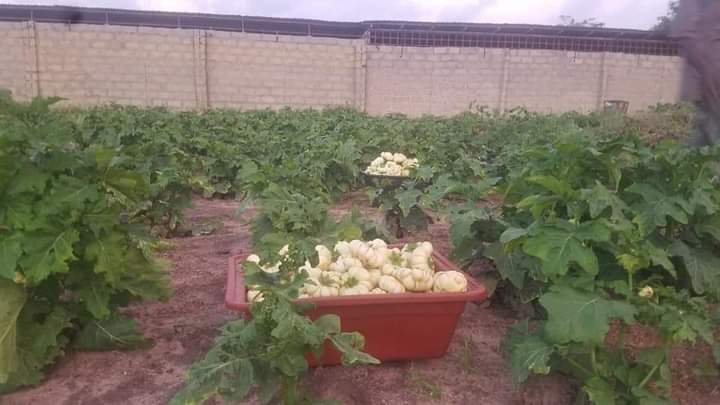12 Requirement For Growing African Eggplant

Do you want to start a Garden egg farming business and you don't know how to go about it?
Here are 10 requirements you must know;
- Climatic requirement
- Source of planting Material
- Site selection
- Land preparation
- Propagation of garden eggs
- Planting
- Seed rate
- Nutrient requirements
- Fertilizer application
- Pest and Disease Control
- Harvesting
- Yield
1. Climatic requirements
African eggplant or Garden eggs prefer relatively high day (320C) and night (210C) temperatures, thus requiring warm temperatures for optimum growth and development.
2. Source of planting material
Garden Eggs production, like other vegetable production, requires good seeds. Buy certified seeds from reputable seed companies.
3. Site selection
Garden eggs grow in well-drained soils with high organic matter content. The farm should be close to a reliable source of water supply for irrigation.
4. Land preparation
READ ALSO » 6 Easy Steps For Growing Oyster Mushrooms
Thorough land preparation is important in enhancing early crop establishment and adequate weed control. Moreso, garden eggs respond very positively to organic matter, therefore, incorporate 30 tons/ha of decomposed farm-yard manure into the soil at least a fortnight before planting.
5. Propagation of garden eggs
Nurse seeds in a tray or seedbed. Prick out seedlings in seed trays into larger boxes at 2 leaf stage and transplant them to the field at 5 leaf stage. Additionally, apply liquid manure (20kg-25kg cattle/poultry manure in 200L water) or a solution of 6-10g per litre of compound fertilizer high in phosphorus (15-15-15/20-20-0 NPK), at 75ml (1 milk tin) per plant to the base of leaves of seedlings are pale. Alternatively, the already prepared seedling nutrient such as MAP may be applied to boost root growth.
6. Planting
Plant seedlings, preferably late afternoon at a square spacing of 90cmx90cm during the major wet season and 90cmx60cm in the minor season.
7. Seed rate
The seeds rate is 350g to 500g per ha.
8. Nutrient requirements
Nutrients Requirements are 207kg/ha of N, 46kg/ha of P2O5 and 340 kg/ha of K 0.
9. Fertilizer application
Use soil analysis as a guide for fertilizer application. A general recommendation is 2-3 split applications of 250kg to 400kg /ha (a total of 23g/plant) of 15-15-15 NPK compound fertilizer. Side dress at 4,8,12 and 16 weeks after planting and after each harvest apply 5g/plant of Potassium Nitrate (400g/ha).
10. Pest and Disease Control
Posts: Eggplant Skeletonizer ( Selepa docilis ), Fruit borer ( Leucinodes orbonalis ), Pyralid Moth larva( Euzophra villa), thrips sp. and spider mites. These pests can be controlled by routine sprays of recommended insecticides.
READ ALSO » Top 7 Fastest Growing Businesses In Canada
Diseases: Fruit Rot ( Phytophthora parasitica ) and Bacterial Wilt ( Pseudomonas solanacearum). Control by removing diseased plants, practising crop rotation, use of resistant cultivars and applying recommended pesticides.
11. Harvesting
Garden eggs usually start to bear about 2 months after transplanting and may continue to bear for 3 months or more. Harvest the fruit twice weekly while they are relatively young. Fruits must have shiny skin and attractive colours. Moreover, during harvesting, cut the fruit from the branches with about 5 cm stalk and calyx attached.
12. Yield
A yield of 15-40 tons/ha can be obtained depending on the variety and application of good agricultural practices.
